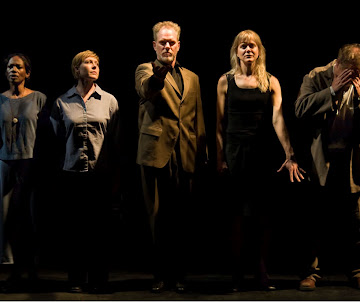Stirring and Profound

“What drives good people to do bad things?” What a powerful question. One I’d rather not think about too hard. I think of myself as a good person. Would I do those awful things given the right circumstances?
Goodness is a compelling exploration of this question. So much more so because they leave things out! Big chunks of the story are absent because life just doesn’t tie up in neat justifiable black and white packages. Everything you need is there, but nothing is explained. I loved the brutal reality of this play, the intentional ambiguity. Not flakey just... without apology.
The interaction between the Michael Redhill (the character) and Older Althea who tells him her story, emphasizes our compulsion to fill out the details, to oversimplify and romanticize. At one point he is berated by her for imagining dialogue that happens “off stage”. I loved it! Of course everything is subjective interpretation, but the more aware we are of our own part in the stories we are told, the closer we can come to the truth. And the closer we can come to an awareness of our selves in it all.
This play brought home how important it is to remember that bad things, like Genocide, don't happen because some evil corporation or governement makes a big movement. It's not an us and them scenario. It's the individuals that make up the whole. We all have a responsility in the events around us, whether we engage or ignore or complain or write or make theatre, we need to start acknowldeging that. I don't believe there are bad people. Everything seems justifiable at the time, otherwise you wouldn't do it.
I loved the structure of this play. Simple. Profound. Moving. At one point I had tears rolling down my cheeks. At another I laughed so loud I was embarrassed that everyone in the audience and cast might be looking at me. This is a deeply human play. About personal values and morality. About living together. About idealism. And about choice.
In the director’s notes Ross Manson says “I cannot know what it (the play) will say to each of you, but I do know that art is a candle that lets us peer safely into darkness: a small light, best shared.” I can only second that sentiment. And since I did share this experience with a friend of mine, Genevieve Koehl, I thought I’d share the discussion we had over coffee afterwards:
Danielle:
I love that self-consious writer in the story style. Well, I like it when it’s done well, when it's done badly it's awful. Beginnings are important to me. I’m always curious to see how the actors and director decide to bridge the gap between audience and characters. I really liked the way they did it here. And the singing was soul-wrenching, very much set the scene.
Genevieve:
Yes, I thought they had a poignant use of sound, external to but accompanying the dialogue. Especially as someone who is a native English speaker, hearing the music in a language I didn’t speak, it was more moving because I was hearing voices. We all have voices because we’re all human and we communicate that way. It allowed me to receive the message of the united human experience. It’s easy to create us and them.
Danielle:
What was your favourite part of the show? What are you going to take away with you?
Genevieve:
Maybe because I’m an amateur theatre goer I tend to want more set but I thought that they used the space very well. I learned that when dialogue and staging are used optimally you really don’t need it. I was just so captivated. What was your favourite part?
Danielle:
Aside from the singing? I think that initial conversation in the bar. I mean, all the acting was phonomenal and there were other bits late in the play that were better. But the bit in the bar was may favourite part. I felt I could imagine having that conversation when travelling one day. It spoke to the adventurer in me. Want to make the parting shot?
Genevieve:
To anyone who reads this review: If you’re trying to understand how to be in the world and how you participate in conflict, then you should see this play.



